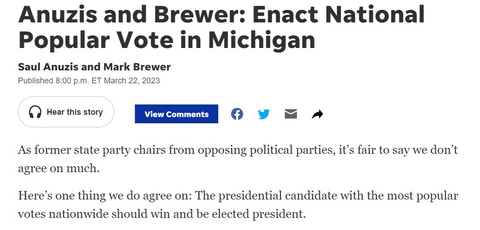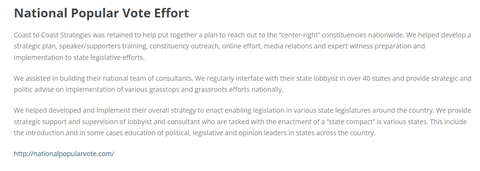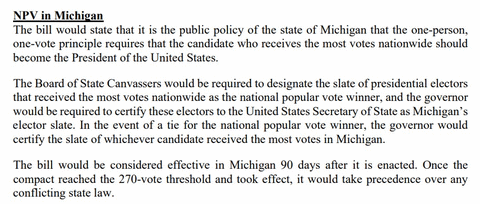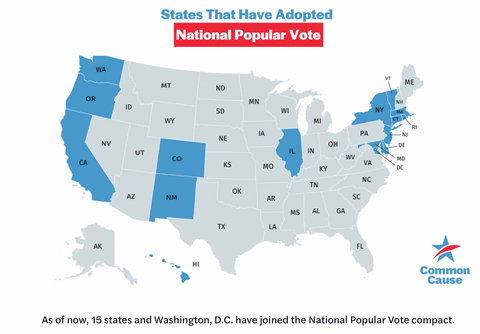Commentary
National Popular Vote plan would disenfranchise Michigan voters
Michigan voters often decide presidential elections; that would end under proposed law

Under current law, Michigan voters choose who gets Michigan’s electoral votes. Under the National Popular Vote, the Michigan vote would only be used to break a tie. | Shutterstock
It was meant to warm the heart, seeing former leaders of the Michigan Republican Party and the Michigan Democratic Party share a byline in The Detroit News, pushing the National Popular Vote. Civility in our time.
But underneath a facade of bipartisanship is a plan to disenfranchise the Michigan voter.
If you don’t like it when a 538-member Electoral College chooses the president, you’ll hate it when 23 secretaries of state meet in a smoke-filled room to choose the president.
The National Popular Vote compact would give elites more power, not less, to decide who leads American government.
If Michigan were to join the National Popular Vote compact, the scheme would have 210 of the 270 electoral votes needed to take effect.
If just a few other states join on, your vote would be watered down in presidential elections.
“A National Popular Vote would make all 50 states battleground states,” Republican Saul Anuzis and Democrat Mark Brewer wrote this week in The Detroit News. “It would mean every vote would count and every voice would be heard.”

Both Anuzis’s firm, Coast to Coast Strategies, and the law firm that employs Brewer, Goodman Acker, have been paid thousands by the “yes on National Popular Vote of Michigan” campaign, according to state finance records. That wasn’t mentioned in the op-ed.

Anuzis and Brewer also forgot to mention what would happen to your vote.
Under current law, the Michigan vote is the deciding factor in awarding Michigan’s electoral votes. But according to the House Fiscal Agency analysis of House Bill 4156, Michigan’s top vote-getter would receive Michigan’s electoral votes only in the event of a nationwide tie. That’s right: Under the National Popular Vote compact, Michigan, a vital and sometimes decisive swing state in presidential votes, would be reduced to a tie-breaker.
Disenfranchisement is not more appealing because the spokesmen are bipartisan.
A certified tally of what advocates call the “national popular vote” would only be possible with an amendment to the U.S. Constitution and the creation of a federal agency charged with counting up every ballot filed across all the states and territories. Election night would no longer exist. Weeks later, we would learn who has been declared president.

The National Popular Vote idea is popular among Democrats who believe Al Gore should have won the presidency in 2000 rather than George W. Bush, and that Hillary Clinton should have won in 2016 rather than Donald Trump.
They don’t see that things could change tomorrow.
Consider this hypothetical: It’s 2028, the National Popular Vote Compact is live, and President Ron DeSantis is running for reelection against Democratic nominee Gretchen Whitmer.
Whitmer carries Michigan, but DeSantis wins the national popular vote. Michigan’s 15 electoral votes go to DeSantis.
Is that “one person, one vote”? Whitmer would lose her home state in the only tally that matters, electors, because voters in Florida and Texas supported DeSantis in great numbers. This is disenfranchisement, not democracy.

And disenfranchising Michigan voters is an odd way to pursue Anuzis and Brewer’s vision that “every voter, no matter where they live, should be politically relevant.”
Michigan is one of a few battleground states right now.
If “all 50 states” became battleground states, as Anuzis and Brewer hope, Michigan will get less attention, fewer campaign stops, and fewer promises made on the issues that matter to Michigan.
The National Popular Vote scheme would be done to you, not for you.
Speak up now. If this compact takes effect, your voice will only matter in the event of a tie.
James David Dickson is managing editor of Michigan Capitol Confidential. Email him at dickson@mackinac.org.
|

National Popular Vote plan would disenfranchise Michigan voters
Michigan voters often decide presidential elections; that would end under proposed law
It was meant to warm the heart, seeing former leaders of the Michigan Republican Party and the Michigan Democratic Party share a byline in The Detroit News, pushing the National Popular Vote. Civility in our time.
But underneath a facade of bipartisanship is a plan to disenfranchise the Michigan voter.
If you don’t like it when a 538-member Electoral College chooses the president, you’ll hate it when 23 secretaries of state meet in a smoke-filled room to choose the president.
The National Popular Vote compact would give elites more power, not less, to decide who leads American government.
If Michigan were to join the National Popular Vote compact, the scheme would have 210 of the 270 electoral votes needed to take effect.
If just a few other states join on, your vote would be watered down in presidential elections.
“A National Popular Vote would make all 50 states battleground states,” Republican Saul Anuzis and Democrat Mark Brewer wrote this week in The Detroit News. “It would mean every vote would count and every voice would be heard.”
Both Anuzis’s firm, Coast to Coast Strategies, and the law firm that employs Brewer, Goodman Acker, have been paid thousands by the “yes on National Popular Vote of Michigan” campaign, according to state finance records. That wasn’t mentioned in the op-ed.
Anuzis and Brewer also forgot to mention what would happen to your vote.
Under current law, the Michigan vote is the deciding factor in awarding Michigan’s electoral votes. But according to the House Fiscal Agency analysis of House Bill 4156, Michigan’s top vote-getter would receive Michigan’s electoral votes only in the event of a nationwide tie. That’s right: Under the National Popular Vote compact, Michigan, a vital and sometimes decisive swing state in presidential votes, would be reduced to a tie-breaker.
Disenfranchisement is not more appealing because the spokesmen are bipartisan.
A certified tally of what advocates call the “national popular vote” would only be possible with an amendment to the U.S. Constitution and the creation of a federal agency charged with counting up every ballot filed across all the states and territories. Election night would no longer exist. Weeks later, we would learn who has been declared president.
Related reading: ‘National Popular Vote’ scheme would let California choose Michigan’s president
The National Popular Vote idea is popular among Democrats who believe Al Gore should have won the presidency in 2000 rather than George W. Bush, and that Hillary Clinton should have won in 2016 rather than Donald Trump.
They don’t see that things could change tomorrow.
Consider this hypothetical: It’s 2028, the National Popular Vote Compact is live, and President Ron DeSantis is running for reelection against Democratic nominee Gretchen Whitmer.
Whitmer carries Michigan, but DeSantis wins the national popular vote. Michigan’s 15 electoral votes go to DeSantis.
Is that “one person, one vote”? Whitmer would lose her home state in the only tally that matters, electors, because voters in Florida and Texas supported DeSantis in great numbers. This is disenfranchisement, not democracy.
And disenfranchising Michigan voters is an odd way to pursue Anuzis and Brewer’s vision that “every voter, no matter where they live, should be politically relevant.”
Michigan is one of a few battleground states right now.
If “all 50 states” became battleground states, as Anuzis and Brewer hope, Michigan will get less attention, fewer campaign stops, and fewer promises made on the issues that matter to Michigan.
The National Popular Vote scheme would be done to you, not for you.
Speak up now. If this compact takes effect, your voice will only matter in the event of a tie.
James David Dickson is managing editor of Michigan Capitol Confidential. Email him at dickson@mackinac.org.
Michigan Capitol Confidential is the news source produced by the Mackinac Center for Public Policy. Michigan Capitol Confidential reports with a free-market news perspective.